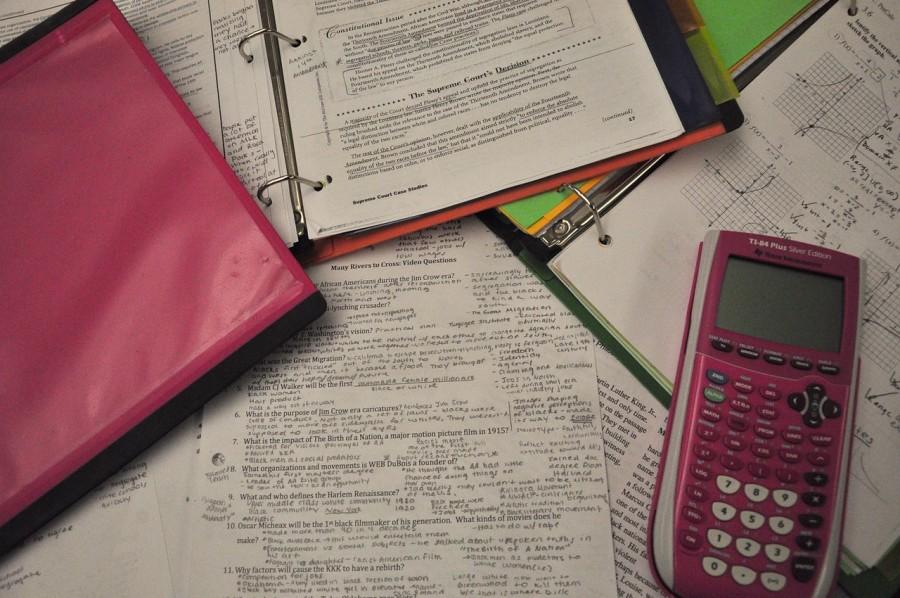Opinion: Midterms do not test students’ knowledge
Credit: Abby Stoller
WSPN’s Jackie Stoller and Jay Abdella offer their best tips and tricks on how to ace your midterm exams this week.
January 22, 2016
Midterms are the most stressful and difficult week of the year, and these five or six tests represent an unrealistic amount of material and percentage of final grade. Although midterms may be good practice for finals exams in college, high schoolers have enough going on in their lives, and students do not need extra loads of stress piling on their shoulders.
The week of January 23rd, is the week of the year that students dread more than anything. Midterms are a two hour test that covers every little detail you have learned that year since September. These short two hours can drastically change and impact your final grade. They are worth 10% of your final grade, which is an unreasonable amount. At WHS, students often study a pretty good deal before a unit test or quiz.
Because there is so much material on midterms, most students spend hours and hours preparing for the dreadful two hour test. However, because there are only 24 hours in a day, and five or six exams in one week, where do students find the time to prepare? At the same time, winter sports are at the peak of their season, family life can conflict, and some students take SATs the weekend before. Midterms are unrealistic and not a great way to test students knowledge. In fact, tons of students stay up until 2 a.m. or later studying. How is this healthy? In addition, according to many teachers, we should expect to score 10% lower than how we normally get graded each quarter. If even the teachers believe this, then there is clearly a major problem.
Midterms are also known as a very high-stress week in January. Students pull all-nighters, staying up studying so they don’t fail their midterms. Teachers are constantly telling us to calm down and not to worry as much because the tests are only worth 10% of our grades, but in reality, the stress is coming from them. Over a span of three days, we have to recall everything that we had learned over a five month period. If you talk to most students taking midterms, they are all completely stressed and are studying for hours on end. As many people know, stress is very unhealthy. It can increase the risk of multiple conditions and diseases, but it also decreases most students’ ability to do well on tests. So, the stress of midterms leads to bad grades on midterms, which then leads to even more stress; it is a very unhealthy cycle. In a work environment, you would never have to do this because you would always have a partner or notes to look on. So, when teachers tell us that it will help us in the long run, it is just one big lie.
In comparison to finals, midterms are more difficult because of their timing. Finals take place during the last week in the school year, and students look forward to summer vacation. Many use it as motivation to get through the week. As for midterms, students realize there is still another half of the year left, and this may cause them an extra load of stress. In addition, some finals are often broken up into various parts over the course of several days, which separates the workload into smaller chunks. This is a less overwhelming form of exam, and Wayland High School should consider trying midterms in this format.
Opinion articles written by staff members represent their personal views. The opinions expressed do not necessarily represent WSPN as a publication.


























Becca • Jan 23, 2016 at 9:07 PM
While I agree that stress is definitely an issue, it seems to me that a lot of it can come from not knowing how to approach studying well. Pulling all-nighters is *not* an effective way of learning material – there are plenty of studies out there proving that giving yourself time to sleep will help you out much more than pushing yourself to read through all those pages of notes a few more times.
You also have to understand your own schedule leading up to the exams – are you in a team that has games around that time? Do you have family commitments? Should you maybe choose another weekend to take the SATs? If a student knows that they will be losing a certain amount of time for other activities, they need to budget their time around those other commitments. Maybe you need to start studying a week or so earlier than usual, even if that means giving up some time during break – isn’t that worth saving yourself from all the stress later on closer to exams, so you have time to participate in other activities and relax (which may actually help you retain information better)? Is giving up an hour or two a day over break really worse than not sleeping the week of exams?
I will absolutely agree that there are exams that are sometimes too hard, but it’s a fact that you’re going to have to get used to studying for exams, because that’s a fact of life in college too, and they don’t get any easier! As a WHS alumna I can absolutely say that learning good study habits in high school prepared me so much better for college exams than a lot of my peers. Yes, WHS tests can be hard, but establishing good study habits now and learning what kind of studying works for you will make a HUGE difference when you move on.
So yes, we should hold our teachers accountable for having fair exams, but remember that exams are there to test your knowledge and ability to put everything together, because sometimes there really isn’t any other way of assessing how much you’ve learned from a course. Of course you can remember something right after you learned the unit, but testing whether or not you actually processed the information so that it sticks with you is just as important. As much as the teachers are responsible for giving fair exams, so are the students responsible for learning what study habits are effective and healthy. If you choose to stay up until 2 AM studying instead of giving yourself a good night’s sleep the night before the exam, don’t blame the school for that.